#Johannes Wieck
Explore tagged Tumblr posts
Text












The Classical Composer Zodiac
#astrology#classical composers#classical music#my edit#zodiac#johann sebastian bach#johannes brahms#igor stravinsky#gustav mahler#claude debussy#clara wieck-schumann#franz liszt#johann strauss jr#ludwig van beethoven#giacomo puccini#wolfgang amadeus mozart#fryderyk chopin#baroque#classicism#romanticism#impressionism#20thcentury#mypost#photo
62 notes
·
View notes
Text

(A Little Life, Part 5, Chapter 2, pg. 602 - Hanya Yanagihara)
Why Schumann?
After some digging on the internet, I have learnt that it is not a coincidence that Hanya chose Schumann's Fantasie in C for this moment, and I believe Jude was playing the first movement in this part. Fantasie in C was composed in 1836 as only a piece called Ruines, expressing his distress at being distant from his beloved Clara, and then it became the first movement of Fantasie. The first movement of the work contains a musical quote from Beethoven's song cycle, An die ferne Geliebte (To the distant beloved) as a secret love message:
Take, then, these songs, beloved, which I have sung for you
However, this musical quotation was not acknowledged by Schumann. The movement also was prefaced with a quote from Friedrich Schlegel:
Durch alle Töne tönet / Im bunten Erdentraum / Ein leiser Ton gezogen / Für den, der heimlich lauschet.
Resounding through all the notes / In the earth's colorful dream / There sounds a faint long-drawn note / For the one who listens in secret
During this period, Robert Schumann and Clara Wieck was in separation because Clara's father disapproved of their relationship. Those quotations truly reflected his yearning to Clara, his passionate love to her, and it is more beautiful to learn that they communicated mostly through music and journals because Clara did not communicate verbally well. In a letter sent to Clara in 1838, he wrote:
The first movement may well be the most passionate I have ever composed - a deep lament for you.
They got married in 1840 but their marriage was not through an easy path because Schumann was not mentally well.
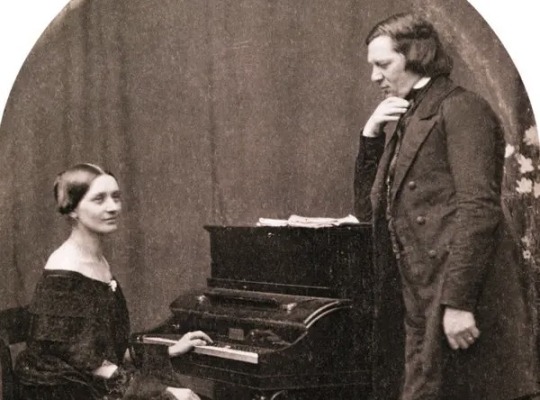
(Clara and Robert Schumann around 1850. Corbis, via Getty Images)
In August of 1844, he suffered a severe mental and physical breakdown. He was in pains, he trembled, wept, could not sleep and even became so sick that he could not walk across the room by himself. By February of 1854, Schumann insisted to be committed, as he felt that he had lost control of his mind. On 27th February, he attempted suicide by throwing himself from a bridge into the Rhine River. He was rescued and taken to the hospital later and remained there until his death on 29th July, 1856. During his confinement, Clara was not allowed to visit him (they communicated thanks to Johannes Brahms, a very good friend of the family, especially Clara) and only able to meet him 2 days before his death.
In Clara's journal on 26th February, 1854 (1 days before his attempt suicide), she wrote:
He was so melancholy that I cannot possibly describe it. When I merely touched him, he said, "Ah Clara, I am not worthy of your love." He said that, he to whom I had always looked up with the greatest, deepest reverence.
The resemblance of Jude and Schumann's mental illness may be one of the reason that Hanya chose this piece for Jude to play after he and Willem got home after their big fight. Jude plays the song with the intention to ease his sadness and fear. In this moment, he feels that this might be the end of their relationship, he is afraid that Willem would leave him because now he finally sees how sick he is. The piece Fantasie symbolizes a yearning for love but in this moment, it is a calling for Willem to stay, to understand, to forgive his action, his sickness.
Sources:
Acreman, Thomas. (2017). The Love Story of Clara Schumann. Retrieved from http://www.classichistory.net/archives/clara-schumann
Wilson, Frances. (2019). A Love Letter in Music Schumann's Fantasie in C, Op. 17. Retrieved from https://interlude.hk/love-letter-music-schumanns-fantasie-c-op-17/
#a little life#hanya yanagihara#jude st. francis#willem ragnarsson#robert schumann#clara schumann#literature#classical music#schumann#thank you to people who reblogged this post i don't know how to comment on your reblog post#my a little life revisit diary
91 notes
·
View notes
Text



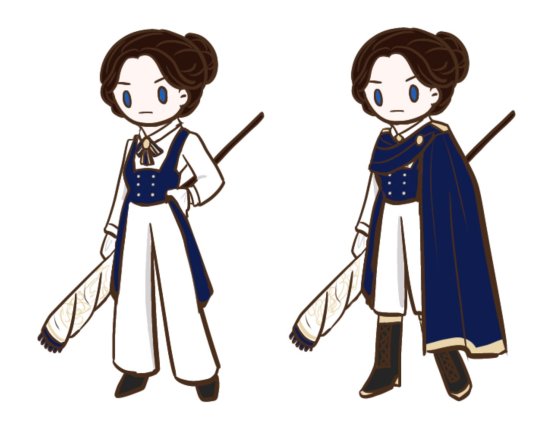
War of the romantics-The Classicists
Commander Felix Mendelssohn
Advisor Fanny Mendelssohn
Aide-de-camp Johannes Brahms
Support officer Clara Wieck
+
Radical Romanticist (Rebel) Hector Berlioz

30 notes
·
View notes
Text
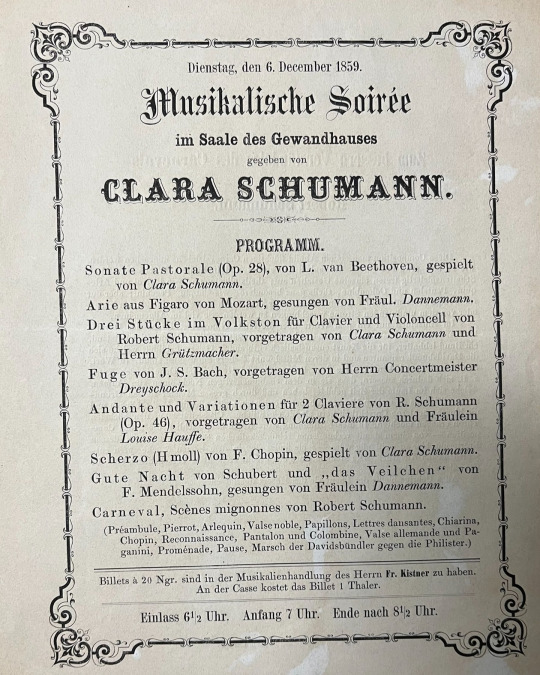

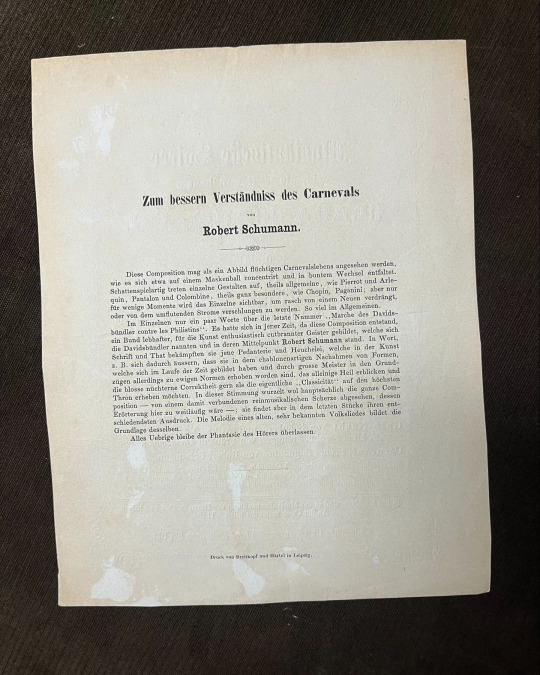

OTD in Music History: Historically important virtuoso pianist and composer -- and widow of legendary composer Robert Schumann (1809 - 1856) -- Clara Schumann nee Wieck (1819 - 1896) is born in Leipzig, Germany. Regarded as one of the most distinguished pianists of the 19th Century, Clara exerted tremendous influence over the musical culture of Europe throughout her remarkable six-decade career. A child prodigy who was trained by her father, she embarked on her first international concert tour at the age of just 11. While still a teenager, Clara married Robert against her father’s loud protestations. Although the marriage was a happy one which produced eight children, she was thereafter forced to sublimate her career to husband’s career for nearly twenty years. It was only after Robert was confined to an insane asylum in the 1850s that Clara truly blossomed as a mature virtuoso, bolstered by her close personal and professional relationships with Johannes Brahms (1833 - 1897) and violin virtuoso Joseph Joachim (1831 - 1907)... PICTURED: An original copy of the program that was handed out to audience members who attended a concert which Clara gave in her hometown of Leipzig in 1859, sponsored by famous German music publisher Breitkopf & Haertel. Very much in keeping with her “conservative” musical bent as well as her tireless dedication to furthering her late husband’s musical legacy, at this concert Clara performed a Sonata by Ludwig van Beethoven (1770 - 1827); accompanied a singer in an Aria from W.A. Mozart’s (1756 - 1791) “Marriage of Figaro” and two Lieder written by Franz Schubert (1797 - 1828) and Felix Mendelssohn (1809 - 1847); played one of Frederic Chopin’s (1810 - 1849) Scherzos; and then topped it all off with several works written by Robert – including his beloved suite of character pieces, “Carnaval.” Quite a program!
#Clara Schumann#Schumann#classical music#music history#composer#classical composer#classical studies#classical pianist#pianist#piano teacher#piano#classical piano#teacher#pedagogue#piano concerto#concerto#concert#Teaching#classical musician#classical musicians#classical#musician#musicians#hisrorian of music#music#music education#classical history#virtuoso#maestro#diva
12 notes
·
View notes
Text
Any idea for Marie's maiden name? Does she have a middle name? What's your suggestion?
I'll start with Marie Elizabeth Wieck. Elizabeth as a middle name because it is aurally congruent with "Wieck"?? The maiden name was inspired by Clara Schumann's because the Clara/Robert Schumann/Johannes Brahms love triangle is just as tragic as Marie/Nile Dok/Erwin Smith.
6 notes
·
View notes
Text





















~ " - Clara Josephine Schuman Née Wieck -, was one of the most prolific and important pianists and composer of the German Romantic era. Born on September 13, 1819 to two pianists, she was trained by her father from an early age and started giving concerts when she was eleven. Clara married composer and pianist Robert Schumann in 1840 and had eight children with him. Throughout her marriage and after her husband died in 1856, she continued working, composing and performing. She died on May 20, 1896. Regarded as one of the most distinguished pianists of the Romantic era, she exerted her influence over the course of a 61-year concert career, changing the format and repertoire of the piano recital by lessening the importance of purely virtuosic works. She also composed solo piano pieces, a piano concerto (her Op. 7), chamber music, choral pieces, and songs. She grew up in Leipzig, where both her father Friedrich Wieck and her mother Mariane were pianists and piano teachers. In addition, her mother was a singer. Clara was a child prodigy, and was trained by her father. She began touring at age eleven, and was successful in Paris and Vienna, among other cities. She married the composer Robert Schumann, and the couple had eight children. Together, they encouraged Johannes Brahms and maintained a close relationship with him. She gave the public premieres of many works by her husband and by Brahms. After Robert Schumann's early death, she continued her concert tours in Europe for decades, frequently with the violinist Joseph Joachim and other chamber musicians. Beginning in 1878, she was an influential piano educator at Dr. Hoch's Konservatorium in Frankfurt, where she attracted international students. She edited the publication of her husband's work. Schumann died in Frankfurt, but was buried in Bonn beside her husband. Several films have focused on Schumann's life, the earliest being Träumerei (Dreaming) of 1944. A 2008 film, Geliebte Clara (Beloved Clara), was directed by Helma Sanders-Brahms. An image of Clara Schumann from an 1835 lithograph by Andreas Staub was featured on the 100 Deutsche Mark banknote from 1989 to 2002. Interest in her compositions began to revive in the late 20th century, and her 2019 bicentenary prompted new books and exhibitions. Born: Clara Josephine Wieck on 13 September 1819 in Leipzig, Kingdom of Saxony, German Confederation - Died: on20 May 1896 (aged 76) in Frankfurt, German Empire." ~
1 note
·
View note
Text

Loneliness isn’t the physical absence of other people, it’s the sense that you’re not sharing anything that matters with anyone else. If you have lots of people around you – perhaps even a husband or wife, or a family, or a busy workplace – but you don’t share anything that matters with them, then you’ll still be lonely. - Johann Hari
Art: Nigel Van Wieck
28 notes
·
View notes
Photo










Song of Love is a 1947 biopic starring Katharine Hepburn, Paul Henreid, Robert Walker, and Leo G. Carroll.The screenplay based on a play by Bernard Schubert and Mario Silva.
Part II
#song of love 1947#old hollywood#old hollywood movies#vintage hollywood#classic hollywood#golden hollywood#golden age of hollywood#golden age of cinema#golden age actors#black and white movies#Katharine Hepburn#Paul Henreid#Robert Walker#Henry Daniell#Clara Wieck Schumann#Robert Schumann#Johannes Brahms#Franz Liszt#old hollywood biopic#biopic
5 notes
·
View notes
Text

2 notes
·
View notes
Text
Ocho historias de mujeres (y II)
[Viene de la entrada anterior]
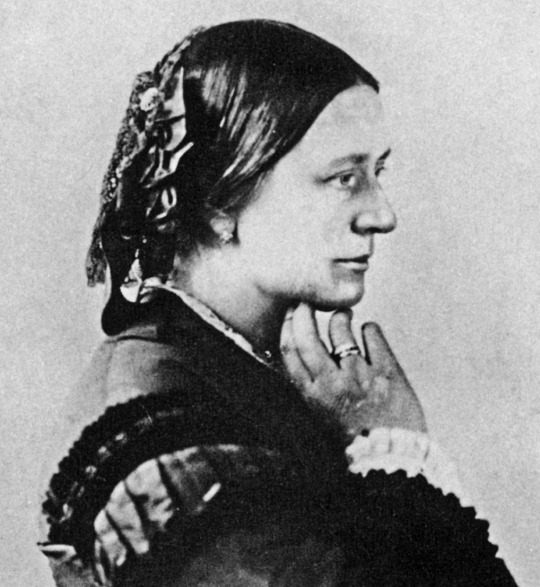
[Clara Schumann, nacida Wieck]
6. Clara Schumann (1819-1896). Esa distinción entre música masculina y femenina, gravitó también permanentemente sobre la obra de Clara Wieck, hija de un profesor de piano que la convirtió en una de las grandes virtuosas del instrumento en todo el siglo XIX.
Debutó con sólo nueve años en la Gewandhaus de Leipzig y a los once se cruzó en su vida Robert Schumann, que había ido a estudiar con su padre. La pareja sentimental más famosa de la historia de la música se formó y consolidó en los años siguientes. Robert y Clara acudieron incluso a los tribunales ante la oposición del padre a su matrimonio, que en un gesto desafiante muy notable celebraron un día antes de que ella cumpliera los 21 años, límite legal para su emancipación. Con el tiempo, Friedrich Wieck aceptaría la unión. La pareja tuvo ocho hijos, pese a lo cual Clara no abandonó su carrera de concertista que en la época incluía por supuesto la composición, pues los virtuosos debían de ser capaces tanto de improvisar como de presentar sus propias obras. Como reconoce Beer, la figura de la mujer como intérprete estaba ya plenamente aceptada en la época. Una anécdota resulta significativa al respecto. Robert acompañó a su esposa en muchas de sus giras. Una vez, en Rusia, al final de una actuación, un príncipe local se acercó entusiasmado a saludar a la pianista, quien le presentó a su esposo. “Ah, ¿y usted también es músico?”, preguntó el aristócrata. Pero las convenciones de su época condicionaron la tarea creativa de Clara. “Una mujer no debe desear componer. Ninguna ha sido capaz de hacerlo, así que ¿por qué podría esperarlo yo?”, llegó a escribir en su diario. Pese a ello, dejó varias decenas de canciones y piezas pianísticas así como un concierto para piano(escrito a los 13 años y con el que tuvo gran éxito) y un trío que hoy suele grabarse e interpretarse muy a menudo. Clara sobrevivió cuarenta años a Robert. Nunca volvió a casarse. La naturaleza de sus relaciones con Johannes Brahms nunca ha sido del todo aclarada.
youtube
----------
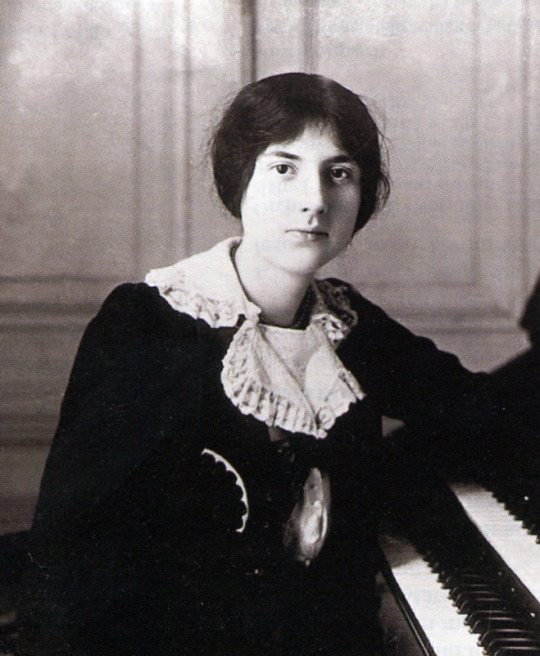
[Lili Boulanger, muerta en plena juventud]
7. Lili Boulanger (1893-1918). Nieta de una famosa cantante, hija de un compositor que había ganado el Premio de Roma a los 19 años y hermana pequeña de Nadia, que marcó como profesora a generaciones de compositores durante más de medio siglo, la vida de Lili Boulanger estuvo condicionada por la enfermedad.
Resulta ciertamente incomprensible que Anna Beer afirme que “los síntomas físicos de una enfermedad incapacitante y en última instancia mortal se han ocultado a conciencia”, cuando es lo primero que se destaca en cualquier acercamiento a su vida, como inescrutable que diga que sobre ella, a su juvenil muerte, se cernió la sombra de la cortesana sin aportar ni un solo testimonio sobre la cuestión (ni siquiera un chisme). Lili fue ante todo una mujer libre y con un talento universalmente reconocido. Fue la primera mujer en ganar el Premio de Roma y su música tuvo siempre una alta consideración de la crítica. Es cierto que la fragilidad de su salud se unió con cierta frecuencia a esa idea de la delicadeza del eterno femenino, pero hoy día su obra está plenamente asentada. Dejó inconclusa una ópera sobre textos de Maeterlinck en la que empezó a trabajar en 1911. Del resto de su producción, no demasiado amplia por razones obvias (murió antes de cumplir los 25 años), destacan sus obras corales (algunas de las mejores, de naturaleza religiosa) y sus canciones, aunque dejó también piezas de cámara y sinfónicas.
youtube
----------

[Elisabeth Maconchy]
8. Elizabeth Maconchy (1907-1994). Nacida en Inglaterra, formada entre Dublín y Londres, Maconchy sobrevivió a una tuberculosis contraída a los 25 años y aunque uno de sus pulmones quedó seriamente dañado, tuvo una vida larga y de notable independencia artística.
Discípula de Ralph Vaughan Williams, Maconchy ganó becas y distinciones a lo largo de su carrera para acabar siendo nombrada Dama de la Orden del Imperio Británico en 1977. Casada desde 1930 con William Le Fanu, en quien siempre encontró apoyo y estímulo, su carrera musical está marcada por su férrea disciplina, su altísimo sentido autocrítico y unas influencias que iban de Bartók a Schoenberg. Su primer gran éxito fue una obra sinfónica, The Land, que se estrenó en los Proms en 1930, pero son sus trece cuartetos de cuerda compuestos entre 1933 y 1985 los que más elogios unánimes han encontrado. Su obra es muy amplia, incluyendo ballets y óperas breves, una de ellas (El sofá) de un erotismo muy descarnado. De las ocho compositoras cuyas vidas se cuentan en este libro es posiblemente la menos difundida hoy en relación al volumen y peso de su obra y ello puede deberse a diversas circunstancias. Republicana, izquierdista y autora de una música en general austera y no fácil de escuchar, Elizabeth Maconchy nunca fue una compositora cómoda ni amable ni en el Reino Unido ni fuera de él.
youtube
--------------------
Ignoro quién ha aconsejado a Anna Beer ni cuáles han sido los criterios que la han llevado a seleccionar para las ocho protagonistas de su obra a algunas de las compositoras más conocidas y difundidas de la historia de la música, aunque sospecho que la existencia de bibliografía suficiente para documentarse y escribir sobre ellas ha tenido algo que ver. Eso debería haberla alertado y llevarla a pensar que quizás su tesis no era tan consistente como ella pensaba. Pero lo cierto es que tenía a su disposición otros nombres de magníficas compositoras que podrían haber hecho más justicia al subtítulo de su libro. Propondré al curioso lector ocho alternativas: Kassia, Chiara Margarita Cozzolani, Isabella Leonarda, Maria Antonia Walpurgis de Baviera, Anna Bon di Venezia, Louise Farrenc, Elfrida Andrée, Ruth Crawford.
Ancha es la red, y está llena de música.
--------------------
En la edición de papel de Diario de Sevilla se ha publicado hoy, domingo 7 de julio, una edición abreviada y algo distinta en dos páginas: 1 y 2.
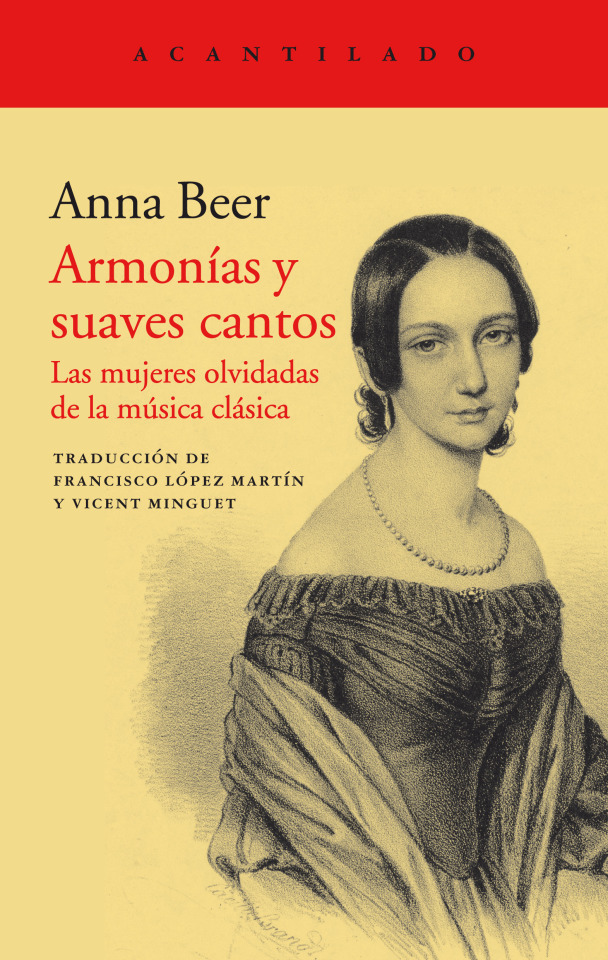
[Armonías y suaves cantos. Las mujeres olvidadas de la música clásica. Anna Beer. Traducción de Francisco López Martín y Vicent Minguet. Acantilado, Barcelona, 2019. 426 páginas.]
LISTA DE REPRODUCCIÓN EN SPOTIFY
#anna beer#acantilado#libros#books#clara schumann#robert schumann#friedrich wieck#johannes brahms#lili boulanger#nadia boulanger#maurice maeterlinck#elizabeth maconchy#ralph vaughan williams#william le fanu#bartók#schoenberg#kassia#chiara margarita cozzolani#isabella leonarda#maría antonia walpurgis de baviera#anna bon di venezia#louise farrenc#elfrida andrée#ruth crawford#música#music
1 note
·
View note
Photo

Ruhe in Frieden, Clara Schumann. A child prodigy at the keys, and later considered one of the most distinguished pianists of the Romantic Era, Clara married Robert Schumann as a youngster, helped support him and their children through his descent into mental illness (and eventual death), and along with Robert helped bring attention and accolades to the young and burgeoning Johannes Brahms. She died on this date in 1896 at the age of 76.
Stamp details: Issued on: November 13, 1986 From: Bonn, West Germany MC #1305
#Clara Schumann#deutschland#germany#stamps#philately#musicians#classical music#composer#may 20#Clara Josephine Wieck#Robert Schumann#Johannes Brahms#pianist#classical pianist#romantic music#romantic era
43 notes
·
View notes
Text
According to my mother, who's become interested in classical music lately, Johannes Brahms was so distraught over Clara Wieck-Schumann's death that he took the wrong train and missed her funeral
I can't find a source confirming how true this is, but this is peak Johannes Brahms energy
#brahms#clara wieck-schumann#clara schumann#classical composers#classical music#johannes brahms#music history#mypost#my post#romanticism#textpost#text post
47 notes
·
View notes
Text
Composers and their dads
Johann Ambrosius Bach

Giovanni Bautista Vivaldi
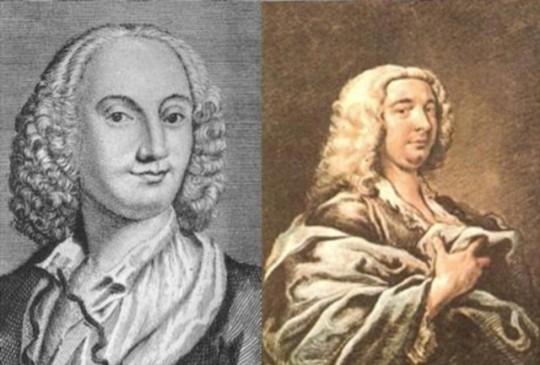
Johann Georg Leopold Mozart

Johann van Beethoven

Franz Theodor Schubert

Louis-Joseph Berlioz

Abraham Ernst Mendelssohn-Bartholdy

Friedrich August Gottlob Schumann

Johann Gottlob Friedrich Wieck

Mikołaj Chopin

.
(Correct me if there's any errors!)
#composers#baroque composers#classical composers#romantic composers#bach#vivaldi#mozart#beethoven#schubert#berlioz#mendelssohn#schumann#wieck#chopin
1K notes
·
View notes
Text
character ages in “the classical kids”
I've seen some of the tags that people are talking about my characters ages. So. HERE'S A POST FOR YA AND SOME BACKGROUND
This story mainly revolves around 4 class, or 4 generations, Baroque, Classical, Romantic, late romantic ft. Impressionists
I don't know if this also applies in Europe, but students in college usually takes 4 years of college/university before graduated. But it could be more or less, depending the student's learning pace.
The ages under the cut bc this post is too freaking long
Baroque
The oldest so far in Baroque is Monteverdi, in the history he was the one who marked the line between renaissance and baroque.
So let's just say, the baroque composers ages here are ranging from 24 - 22, because some of them probably entering late in school, so there would be older generations.
Age 24
Claudio Monteverdi
Barbara Strozzi
Antonia Bembo
Angela Corelli
Age 23
Jeanne Lully
Johann Pachelbel
Antonio Vivaldi
Jean-Joseph Mouret
Age 22
Johann Sebastian Bach
Georg Frederic Handel
Georg Philipp Telemann
Age 21 : Christina Gluck
Classical
The oldest of classical supposed to be Gluck, but I moved Gluck to baroque because some musician still consider Gluck as a baroque composer.
Thus, the oldest here is Haydn. With the age range from 21-19
Age 21
Franz Joseph Haydn
Luisa Boccherini
Antonio Salieri
Maria Anna Mozart
Age 20
Johann Michael Haydn
Wolfgang Amadeus Mozart
Age 19
This is for composers from the transitional period, Classical to Romantic. Or just Romantic but their style leans more to classical. This is in the Rossini's case.
Lotte van Beethoven
Giorgia Rossini
Romantic
This is where's everything is a mess.
So many things happened in the romantic era aka. The 1800s meanwhile the other classes are not. Like in the baroque we lack of traces of some other composer that could have been famous in the era, meanwhile the classical period only last for half of the 18th century.
Anyway, their age ranges from 19 - 18 /which now this part make the post super long/
Age 19
Niccolo Paganini
Carl Maria Von Weber
Franz Schubert
Fanny Mendelssohn
Hector Berlioz
Frederic Chopin
Robert Schumann
Age 18
Felix Mendelssohn
Franz Liszt
Clara Wieck (or Schumann, but they haven’t married duh)
Richard Wagner
Giuseppa Verdi
Johannes Brahms
Tekla Badarzewska
Pyotr Ilyich Tchaikovsky
Late Romantic + Early 20th century + Impressionist
Such mixed up class. Some of them are supposed to be in romantic above but ye I’m just want to group some of these fellas together so they can interact more.
The age ranges from 19 to 17. Yes, wider, because there’s too many romantic composers out there
Age 19
Camille Saint Saëns
Georges Bizet
Age 18
Antonín Dvořák
Eli Grieg
Paula de Sarasate
Francisco Tarrega
Age 17
Isaac Albeniz
Claude Debussy
Carl Nielsen
Jean Sibelius
Erika Satie
Sachi Rachmaninova (yep Rachmaninoff is female here, thus the name Rachmaninova. Idk how it would go using the ‘Rachmaninoff’ spelling)
Yea hope this useless and long ass liszt list help you figure out their background in some way.
- Adine (Cya)
#a trusty guide for ya#in case you guys wondering about their age owo#the classical info#yeaa lots of genderbended name I'm sorry#and lots of characters#that's why idk how this series would go lolol#long post
31 notes
·
View notes
Text




OTD in Music History: Historically important virtuoso pianist – and widow of famous composer Robert Schumann (1809 – 1856) – Clara Schumann (nee Wieck, 1819 - 1896) gives a concert in her hometown of Leipzig in 1859. Robert had passed away in an insane asylum just three years earlier.
Regarded as one of the most distinguished pianists of the 19th Century, Clara Schumann exerted tremendous influence over the musical culture of Europe over the course of her remarkable six-decade concert career. A child prodigy who was trained by her father, she embarked on successful tours of both Paris and Vienna at the age of just 11. While still a teenager, however, she met and married Robert – against her father’s famously loud protestations – and although the marriage was a happy one that produced eight children, she was forced to sublimate her budding career to her husband’s career for nearly twenty years. It was only after Robert’s confinement in the asylum that she truly blossomed as a mature virtuoso, bolstered by her close relationships with composer Johannes Brahms (1833 – 1897) and violin virtuoso Joseph Joachim (1831 - 1907).
PICTURED: An original copy of the program that was handed out to audience members at the concert referenced above.
Entirely in keeping with her famously “conservative” musical bent (and her equally tireless dedication to furthering her late husband’s musical legacy), on this occasion Clara performed a Beethoven sonata, accompanied a singer in an aria from Mozart’s “Marriage of Figaro” and two lieder by Schubert and Mendelssohn, played a Chopin Scherzo, and ripped through several works written by Robert – including his famous suite of character pieces, “Carnival.” Quite a program!
It is also worth noting that this concert is "conservative" in another way -- Clara chose to share her program with another musician (in this case, a singer). That was standard practice in the first decades of the 19th Century -- Franz Liszt (1811 - 1886) essentially single-handedly "invented" the solo instrumental "recital" (as he dubbed it) in London in 1840. It didn't immediately catch on, and in fact Liszt took criticism for his arrogance in some quarters -- but by the late 1850s, solo instrumental recitals had become fairly common place occurrences. Nevertheless, this program finds Clara (who by this time absolutely despised Liszt on both a personal and a musical level) still operating in the more "traditional" mode and still sharing the stage with at least one other musician, even though the program on its face seems to suggest that this is *her* recital...
#Clara Schumann#Clara Wieck#pianist#piano#Schumann#composer#classical composer#pedagogue#piano teacher#piano concerto#concerto#concert#Teaching#Concerts#Orchestra#Overture#Chamber#Romance#Sonata#Allegro#Praeludium#Cadenza#Choral#Symphony#opera#bel canto#Serenade#classical music#music history#classical studies
1 note
·
View note
Video
vimeo
Volvo: The ABC of Death from Jan David Gunther on Vimeo.
Director: Dorian & Daniel Director of Photography: Jan David Günther Production Company: Filmakademie Baden-Württemberg Producer: Celina Finger, Madlen Folk
Gaffer: Johannes Reichau, Maximilian Pittner 1st AC: Adrian Huber, Felix Koster 2nd AC: Alexander Zimmermann Key Grip: Mark Zechner, Manuel Musch Colorist: Dennis Wieck @ Harvest Digital
0 notes